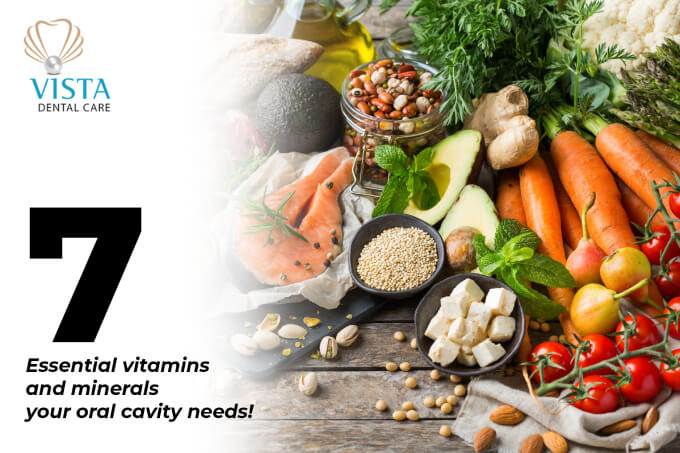Eating healthy is important for overall health but did you know eating right actually helps to strengthen teeth and gums?
A diet rich in vitamins and minerals help to strengthen the teeth naturally but also protects them from foods and drinks that cause acid erosion. Below are some nutrients which are the building blocks are essential for your dental health.
Make sure your diet features these key ingredients for a healthy oral cavity
Calcium
Calcium is well known friend of the bones but it is equally important for the teeth. This mineral in the human body helps in the formation and maintenance of strong bones and teeth. In the oral cavity calcium helps to harden your enamel and strengthen the jawbone.
Source: In addition to milk, good sources of calcium include cheese, yogurt, broccoli, cereals, bok choy, green leafy vegetables, almonds, soy milk, sunflower seeds, shell fish, salmon and sardines.
Vitamin D
Vitamin D plays a crucial role in bone and teeth mineralization. It helps the body to absorb calcium and boost bone mineral density. Vitamin D deficiencies can lead to several oral health disorders, like gingival inflammation, cavities, and gum disease.
Source: Best source of vitamin D is sunlight. It is also present in fatty fish like salmon, mackerel, canned tuna and mushrooms. Some dairy products, foods and drinks are fortified with vitamin D such as milk, orange juice and cereal. Other consumable sources of Vitamin D are by having supplements.
Potassium
Potassium like Vitamin D improves bone mineral density. Potassium along with magnesium prevents blood from becoming too acidic, which can leach calcium from your bones and teeth.
Source: Bananas are cheapest and rich source of potassium. Other sources are fruits and vegetables with high levels of the minerals including oranges, potatoes, sweet potatoes, mushrooms, avocado, beans, tuna, cooked spinach and broccoli.
Phosphorus
Phosphorus supports calcium in building strong bones and teeth. It is one of the key mineral for strong teeth.
Source: Rich sources of the phosphorous include chicken, turkey, pork, beef, organ meat and seafood like, sardines, shrimp, tuna & salmon. Plant-based foods include soybeans, lentils, nuts, pumpkin and sunflower seeds. You can also find it in dairy products.
Vitamin K
Vitamin K is essential for strong teeth and gums as it helps to block substances that can break down healthy bones and plays a vital role in blood clotting. It helps your body produce osteocalcin, a protein that supports & strengthens bone and dentin.
Vitamin K2 is actually a type of protein that works along with Vitamin D to move calcium out of soft tissue to your bloodstream, and into your teeth and bones.
Source: Vitamin K is found in abundance in leafy greens like spinach, fenugreek, leafy black eye peas (chawli), red spinach, Taro leaves (alu), parsley, cabbage broccoli and brussel sprouts can help you increase your vitamin K quota. You can get vitamin K2 from high-fat dairy products, soft cheese, blue cheese, nuts, egg yolk, and liver, meat including chicken, pork and beef.
Vitamin C
Vitamin C strengthens your gums and the soft tissue in your mouth. It can protect against gingivitis, the early stage of gum disease, and can prevent your teeth from loosening. Vitamin C should never be taken in direct contact with teeth.
Source: Citrus fruits are rich source of Vitamin C including oranges, limes and lemons. It is also found in berries, tomatoes, sprouts, kiwi, green leafy vegetables, broccoli, green, yellow and red capsicum and potatoes.
Vitamin A
This vitamin helps keep mucous membranes healthy. It’s good for your eyes and skin along with your mouth. It helps in production of saliva. Saliva helps break down of food, cleans bacteria from in between your teeth, prevents dry mouth and helps your mouth heal quickly.
Source: Vitamin A is mostly found in orange colored foods. Found in vegetables, like carrots, sweet potatoes, bell peppers, carrots, pumpkin, sweet potatoes and apricots. It is loaded in fish, egg yolks and liver. Fruits and veggies contain high levels of beta-carotene, which your body converts into vitamin A. It is also available in supplements.
All the above nutrients are found in daily foods; however for some people it might not be possible to haven these in their daily diet. This nutrient can be consumed by having supplements. It is recommended to consult your physician and dentist before adding any supplements to your routine.


